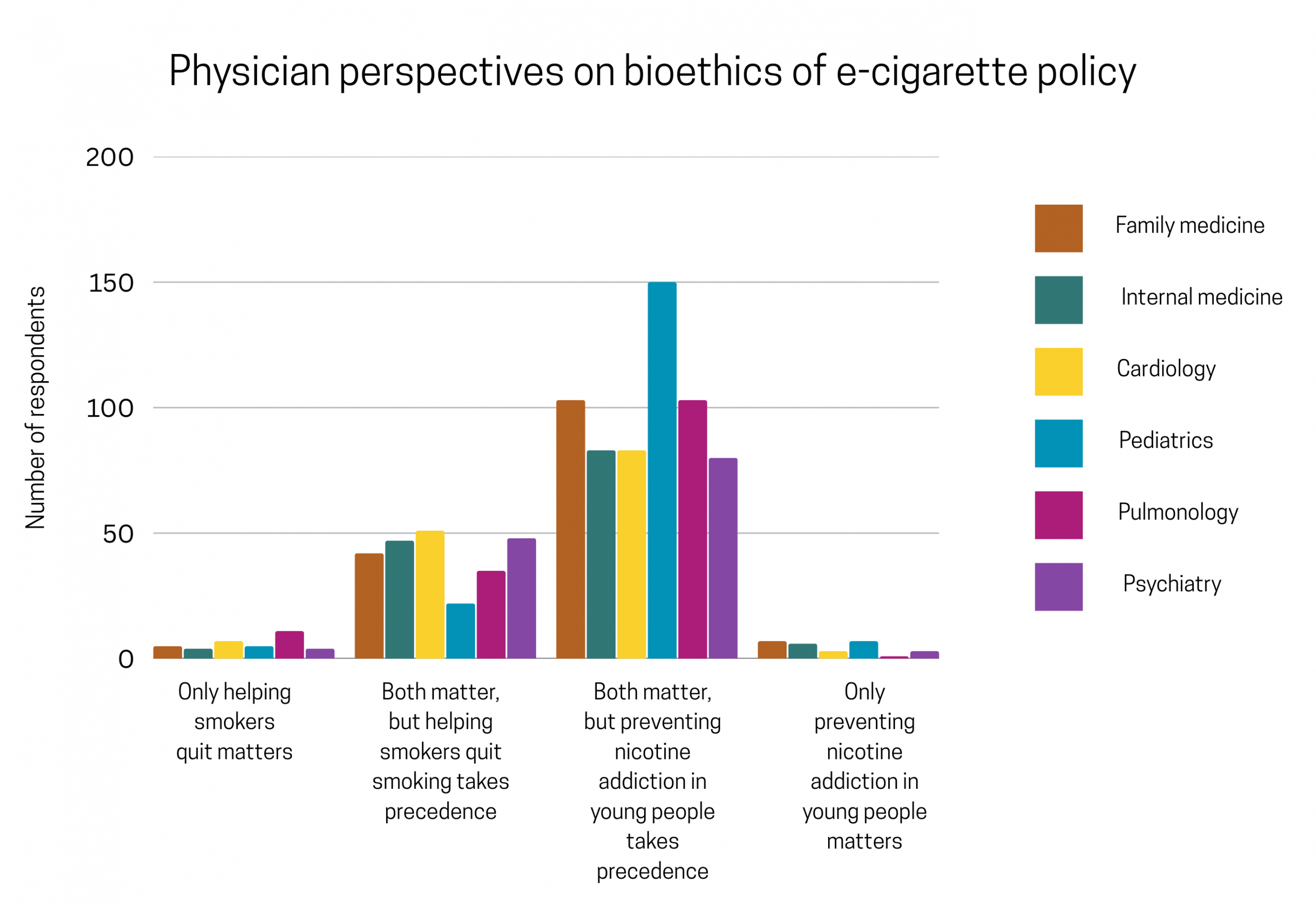The harm reduction qualities of e-cigarettes are debatable. While some studies have found that e-cigarettes can help adults who smoke traditional cigarettes quit this habit, others suggest they also promote nicotine addiction among young people who would not otherwise smoke cigarettes. With these ethical tradeoffs in mind, physicians are uniquely positioned to educate the public and help them make decisions about the risks and benefits of e-cigarettes. This week, ASHES reviews a study by Monica Magalhaes and colleagues that investigated physicians’ perspectives on e-cigarette use and whether these perspectives differ according to specialty.
What was the research question?
Which aspects of e-cigarette use (its harm reduction potential or its addictive potential) do physicians prioritize in society?
What did the researchers do?
The researchers analyzed data from a U.S. national survey of 940 physicians across six specialties, conducted between 2020 and 2021. Participants answered questions about tobacco-related issues, including a scenario-based question about the risks/benefits of using e-cigarettes and a question about the bioethics of e-cigarette policy. They also provided demographic information and details about their treatment practice(s). The researchers used categorical data analysis (e.g., chi-square) and non-parametric testing (i.e., Spearman rank order correlation) to analyze relationships, for example, between physicians’ level of agreement in the harm reduction qualities of e-cigarettes and their views of e-cigarette policy.
What did they find?
The majority of participants (66%) agreed that both helping smokers quit and preventing nicotine addiction among youth were important, but they felt that preventing youth addiction took precedence. This view was common among physicians in all specialties but was most prominent among pediatricians (82%) (see Figure). Similarly, when asked about risks/benefits of e-cigarette use in society, more than half of physicians (64%) prioritized scenarios where the risk of addiction was lower for youth, despite decreased benefits to adults who use e-cigarettes for smoking cessation. Physicians who held more skeptical views on the benefits of e-cigarettes and those who had not prescribed e-cigarettes as a harm reduction strategy were more likely to prioritize youth e-cigarette prevention.

Figure. Physician perspectives on the bioethics of e-cigarette policy, separated by specialty. Click image to enlarge.
Why do these findings matter?
These results indicate that a majority of physicians prioritize nicotine addiction prevention among youth over harm reduction for adults. The reasons why remain unclear, however. Perhaps physicians find it more ethical to uphold the safety of youth over adults because they are more vulnerable, or they wish to reduce the amount of smokers in future generations (i.e., playing the long game). Either way, this perspective seems to overlook the beneficial harm reduction qualities of e-cigarettes. One way to address this would be to restrict e-cigarettes to be prescription only, limiting access to youth but still allowing adults to make use of their harm reduction qualities.
Every study has limitations. What are the limitations of this study?
The data used in this study are cross-sectional; meaning causality cannot be easily determined. Additionally, the survey did not include a response option indicating both harm reduction and addiction prevention were equally as important. It would have been interesting to see if physicians prioritized this over other responses. Future qualitative studies should be conducted to learn more about physicians’ rationale for choosing to prioritize youth prevention over adult harm reduction and whether this sentiment would still stand if prioritizing both equally were a possibility.
For more information:
SmokeFreeTeen and SmokeFree offers tools and tips for quitting and maintaining abstinence from smoking tobacco. The Centers for Disease Control and Prevention also provides research and tips about cigarettes and how to quit. For additional resources, visit our Addiction Resources page.
— Nakita Sconsoni, MSW
Want CE credit for reading BASIS articles? Click here to visit our Courses Website and access our free online courses.




